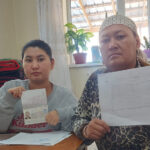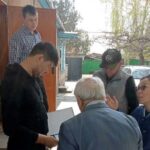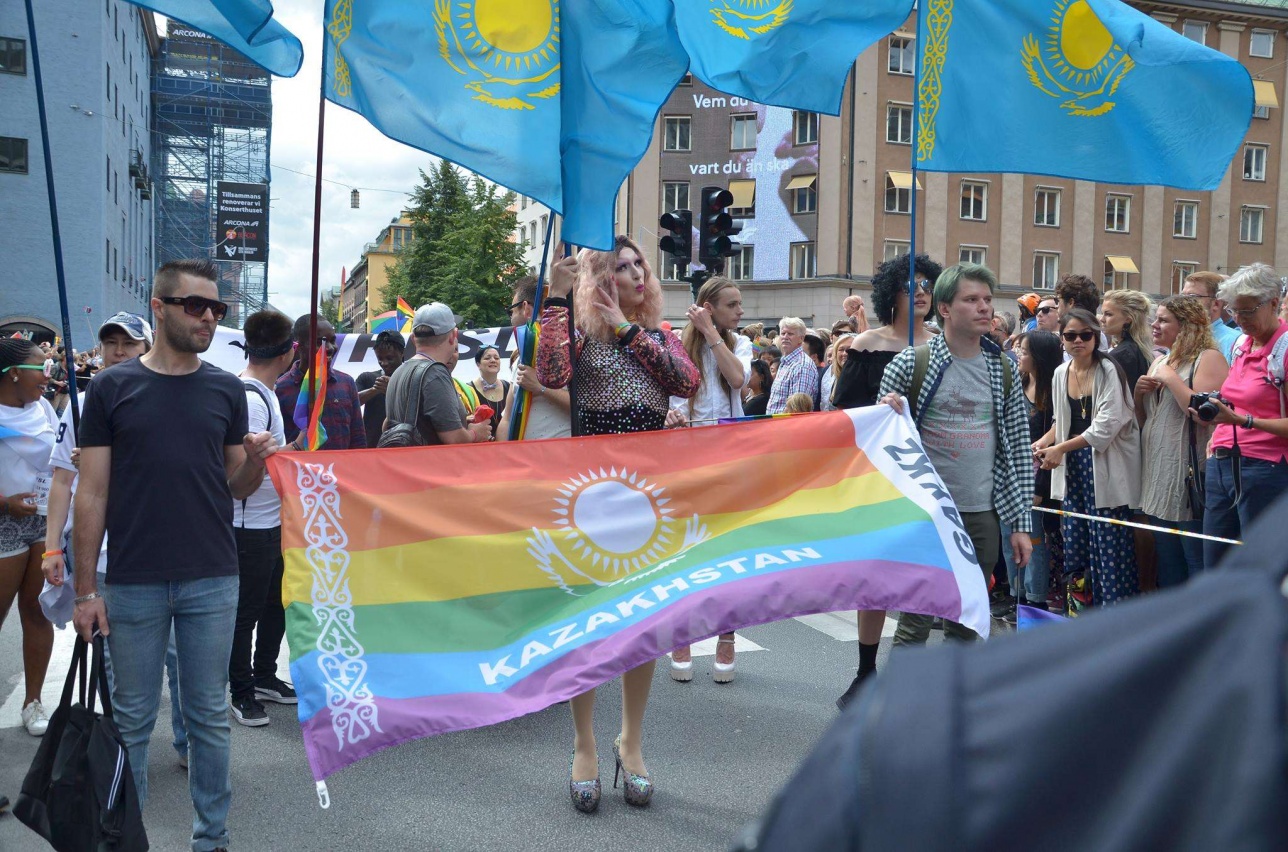Seven individuals – four Jehovah’s Witnesses, two Muslims and a Protestant – are known to have been prosecuted since August 2012 for “illegal missionary activity”, Forum 18 News Service has learned. Many are being given the maximum fine of 100 Minimum Financial Indicators, which in many parts of
One year after
“We are very concerned that more Jehovah’s Witnesses will soon be arrested and convicted for ‘missionary activity’,” Jehovah’s Witnesses told Forum 18 from
Seven “missionary activity” prosecutions so far
Seven individuals – four Jehovah’s Witnesses, two Muslims and a Protestant – are known to have been prosecuted since August 2012 under Article 375, Part 3 of the Code of Administrative Offences. This punishes “illegal missionary activity” with a maximum fine of 100 MFIs (a figure set annually). In 2012 this amounted to 161,800 Tenge. In 2013 this rose to 173,100 Tenge (6,400 Norwegian Kroner, 860 Euros or 1,150 US Dollars). At least three more individuals are known to be expecting prosecution under Article 375, Part 3.
In the same period, one Baptist has already been prosecuted under Article 375, Part 1 with at least two more prosecutions imminent (see below).
Article 375 of the Code of Administrative Offences (“Violation of legislation on religious activity and religious associations”) was significantly expanded and fines were increased under a 2011 Amending Law. It came into force – along with a new restrictive Religion Law – on 25 October 2011.
Officials of the Legal Statistics Committee of the General Prosecutor’s Office in the capital Astana refused to give Forum 18 any statistics for 2011 and 2012 for the number of prosecutions brought under Administrative Code Article 375 or Article 374-1 (which also prescribes punishments for unregistered religious activity). Press officer Saulebek Zhamkenov told Forum 18 on 22 January in writing that it had to submit an official request for the information in writing.
Compounding Jehovah’s Witness fears of further prosecutions was a statement from the ARA published on its official website. It was responding to a 26 November 2012 question from a reader in the southern city of
Astana case
On 4 December 2012, Judge Bayrzhan Akhmetkaliev of Astana’s
The verdict reveals that the Astana Police’s Anti-Extremism Directorate had “established during the course of operational/prophylactic measures” on 15 September 2012 that Bukin was conducting “illegal missionary activity” by leading a two-day religious meeting in a rented building. Anti-Extremism officer I. Zhumagalov told the court he had arrived during the meeting, which was attended by about 200 people, but had been prevented by those present from filming it.
Two officials of the ARA, N. Mukanova and Alia Masalimova, participated in the hearing and agreed with the charges.
However, Bukin rejected the accusations, insisting that his community has state registration and that holding religious meetings does not constitute “missionary activity”.
Bukin appealed to Astana City Court. However, on 16 January
Law Professor Roman Podoprigora of Almaty’s
“Bukin was convicted simply because he had arranged and participated in a religious meeting of Jehovah’s Witnesses. It was evident that the outcome of the hearing was predetermined,” Jehovah’s Witnesses complained to Forum
Erbulan Kusainov, head of the Anti-Extremism Directorate of Astana City Police, admitted to Forum 18 that officer Zhumagalov from his Directorate had been involved in the case against Bukin. However, he refused absolutely to answer any questions. “I won’t give any comment,” he told Forum 18 from Astana on 22 January.
Zhorabek Daurenov, who recently took over as head of the ARA Department in Astana, defended Bukin’s fine. “As patriots of
“According to
Other Astana cases
On 28 December 2012, Astana City Police detained Talgat Bilbayev for “talking near his apartment to a man about the Bible”, Jehovah’s Witnesses complained to Forum 18. They added that the same day, Astana City Police also detained two other Jehovah’s Witnesses – Ahmet Alseyitov and Marat Nurbayev – on similar grounds. All three expect that their cases will soon be forwarded to Astana Prosecutor’s Office.
These cases follow an earlier case when prosecutors initially failed to convict a Protestant under Administrative Code Article 375, Part 3. The police had drawn up a record of an offence after they caught Tamara Kim, a deacon in
Kim told the court that for the previous two months she had led services in her church during the pastor’s absence abroad. However, she rejected accusations that she was thereby conducting “missionary activity”.
The verdict – seen by Forum 18 – reveals that the then ARA Department head A. Mukazhanov insisted to the court that “holding religious rituals and sermons is missionary activity and requires agreement” from his Department. The prosecutor demanded that she be convicted and fined 100 MFIs. However, Judge Kurbatov found that no offence had been committed.
Astana’s Deputy Prosecutor Almat Baishulakov then appealed against the acquittal. On 27 August 2012, Judge Aisina of Astana City Court – who later was to confirm Bukin’s sentence – overturned the earlier decision and fined Kim 100 MFIs under Article 375, Part 3, according to the verdict seen by Forum 18.
The verdict reveals that the ARA sent a letter on 7 August 2012 admitting that the Religion Law does not define “spreading a faith” or “religious rituals and ceremonies”. However, two officials of the ARA’s Legal Department, Mukanova and Masalimova (who were later to testify in Bukin’s case), were questioned in court for a more “objective” view. They testified that religious services and sermons constitute “missionary activity”.
Kim then lodged a further appeal to
On 21 December 2012, Judge Bibigul Alinova of
“Nurzhan was simply answering questions about his beliefs to an interested man who lives in the same building,” Jehovah’s Witnesses complained to Forum 18.
On 14 January 2013, Aglakov filed an appeal to Pavlodar City Court, which set 25 January as the date for the appeal. Jehovah’s Witnesses told Forum 18 they have asked the Court to delay the appeal hearing to allow time to send a lawyer.
Aktau cases
On 15 January 2013, Judge Bolat Pazylov of
Both Shefer and Lashova are planning to appeal against their fines.
Raushan Gaisina, a Deputy Head of Aktau Police, refused absolutely to discuss the fines – or why her officers had been involved in detaining individuals discussing their faith with others on the street. “I’m not embarrassed about this,” she insisted to Forum 18 from Aktau on 22 January. “But I won’t give any information by telephone.”
Gaisina referred Forum 18 to Mangistau Regional Police press department. Reached the same day, an official said nothing when Forum 18 asked why police are involved in detaining individuals who discuss their faith with others on the street. She then hung up. When Forum 18 called back, the line had been diverted to a fax machine.
Equally reluctant to talk was a Deputy Prosecutor in Aktau, Serik Amirov. “You don’t have true information on the case,” he told Forum 18 on 22 January. Told that Forum 18 had taken its information from the Shefer and Lashova’s verdicts, he declined to answer any other questions and put the phone down.
Forum 18 was thus unable to ask Amirov about two members of a Muslim movement reported as also having been fined under Article 375, Part 3 for “illegal missionary acivity”. Deputy Regional Prosecutor Erzhan Berdibekov told the local media on 16 January that the members of the Suleyman Hilmi Tunahan movement had come from other regions of
Aktobe case
Meanwhile, prosecutions are continuing under Administrative Code Article 375, Part 1. This punishes violations of the legal procedure for holding religious worship with a fine of 50 MFIs on individuals and 100 MFIs on leaders of religious organisations.
On 21 January, Aktobe’s
Local Baptists told Forum 18 Abykenov was punished for offering Christian books at a small table to passers-by on the streets of Aktobe in late November 2012. “Police confiscated the books from him and said they were going to conduct an ‘expert analysis’ of them,” the church member told Forum 18. “He doesn’t know if he’ll get them back or not.”
Members of Council of Churches Baptist congregations do not seek state registration in any of the post-Soviet republics where they operate. They also have a policy of not paying fines handed down to punish them for exercising their right to freedom of religion or belief.
Almaty cases
Prosecutors have told two members of Almaty’s Council of Churches Baptist congregation that they will face trial under Administrative Code Article 375, Part 1. “Yuri Bronitsky and Fedor Karabeinikov were summoned to the Prosecutor’s Office on 11 January and told this,” local Baptists told Forum 18 on 22 January. “They were not told when the cases will be heard.”
Police came to the Almaty church as well as to the congregation in Taldykurgan [Taldyqorghan] in Almaty Region. “They came during worship and photographed us,” local Baptists complained. “They said they had an order from above that now the new law has been adopted they will close us down.”
SOURCE:
Forum 18
www.forum18.org/Archive.php?article_id=1792
















